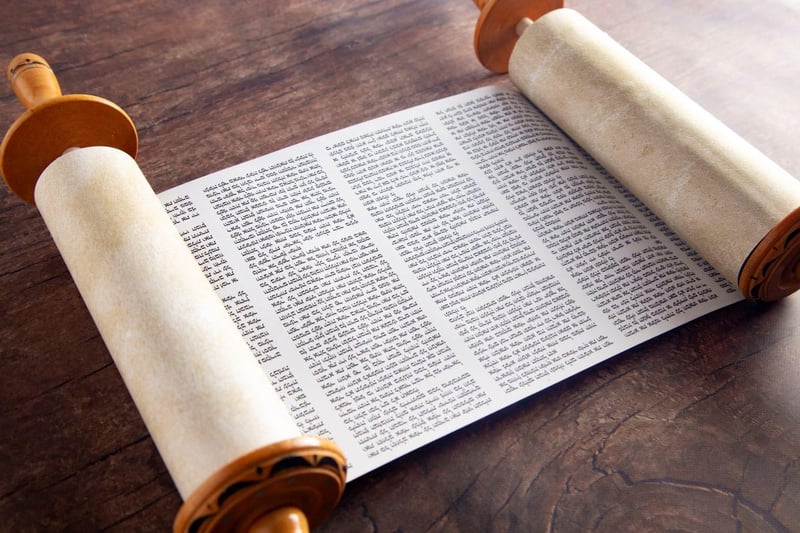The Hebrew word Torah is a key theme in the Bible. It’s used as a name for the first five books and for the Hebrew Bible. What does the Torah mean for Christians?

What is the Torah, a word that frequently occurs in the original Hebrew of the first two-thirds of the Bible, the Old Testament?
Religious Jews talk about Torah, but does it mean anything for Christians? Should it? Do we miss something if we ignore it?
Torah definition
Let’s begin with a definition. According to the New International Dictionary of Old Testament Theology and Exegesis, the word Torah is defined as “direction, instruction, law, the law.” This source goes on to state, “generally speaking tora designates some divine standard of conduct for God’s people” (vol. 4, p. 893).
Simply put, Torah refers to law, most often the law of God—those dos and don’ts that define the way God wishes His people to conduct themselves.
In English the Torah has come to mean the first five books of the Bible (see our article “The Pentateuch”) or the entire Hebrew Bible (the Old Testament).
“The law of the LORD is perfect”
The Bible tells us that the laws of God are both perfect and effective.
According to King David, “The law of the LORD is perfect, converting the soul; the testimony of the LORD is sure, making wise the simple. The statutes of the LORD are right, rejoicing the heart; the commandment of the LORD is pure, enlightening the eyes . . .
“The judgments of the LORD are true and righteous altogether. More to be desired are they than gold, yea, than much fine gold. Sweeter also than honey and the honeycomb. Moreover by them Your servant is warned, and in keeping them there is great reward” (Psalm 19:7-11).
That’s quite high praise for the law of God! It is capable of transforming a human being, making him or her wise, causing rejoicing and enlightening.
Laws, statutes and commandments
God’s laws include a whole range of types of law. There are, of course, the 10 Commandments. These were given by God Himself in Exodus 20 and carry forward into the New Testament (see the article “Are the 10 Commandments Upheld in the New Testament?”).
There are also statutes, or ordinances, laws governing the functioning of a nation (for example, Psalm 81:4), as well as judgments, laws arising for new and different situations (see, for example, Numbers 27:11; 36:13). The whole package constitutes Torah, law emanating from God.
Abraham obeyed God
We read that Abraham, the father of the faithful (Romans 4:1, 16), was a law-keeping man. “Because Abraham obeyed My voice and kept My charge, My commandments, My statutes, and My laws” (Genesis 26:5).
In other words, Abraham kept the Torah, the law of God.
Interestingly, the words used to describe Abraham’s obedience are the same ones used to describe the law, or Torah, that God gave to ancient Israel.
In Deuteronomy 11:1 God commanded the nation Israel, “Therefore you shall love the LORD your God, and keep His charge, His statutes, His judgments, and His commandments always.”
The Hebrew words used in that verse are almost identical to the Hebrew words used in Genesis 26:5. In other words, Abraham kept the Torah. The father of the faithful kept God’s laws long before the Old Covenant was instituted.
Sacrifices in the Old Testament
Some object that the Torah included an elaborate system of animal sacrifices and ritual washings, and that if anyone tries to keep the law in this 21st century, he or she must also practice the old Levitical laws, including the sacrifices, washings and priestly rituals.
In English the Torah has come to mean the first five books of the Bible or the entire Hebrew Bible (the Old Testament).
However, note that the Levitical sacrificial system was added after the Old Covenant was ratified (Exodus 24:1-8; Jeremiah 7:22-23). These Levitical laws were added because the people had transgressed the covenant (Galatians 3:19).
The Hebrew Scriptures themselves tell us what God really wants.
“Sacrifice and offering You did not desire; my ears You have opened. Burnt offering and sin offering You did not require. Then I said, ‘Behold, I come; in the scroll of the book it is written of me. I delight to do Your will, O my God, and Your law is within my heart’” (Psalm 40:6-8).
“For You do not desire sacrifice, or else I would give it; You do not delight in burnt offering. The sacrifices of God are a broken spirit, a broken and a contrite heart—these, O God, You will not despise” (Psalm 51:16-17).
The prophet Jeremiah emphasized the same. “Thus says the LORD of hosts, the God of Israel: ‘Add your burnt offerings to your sacrifices and eat meat. For I did not speak to your fathers, or command them in the day that I brought them out of the land of Egypt, concerning burnt offerings or sacrifices. But this is what I commanded them, saying “Obey My voice, and I will be your God, and you shall be My people. And walk in all the ways that I have commanded you, that it may be well with you”’” (Jeremiah 7:21-23).
The essence of Torah, then, is not the sacrifices, but the heart of the law, the essentials of God’s direction to humanity.
Two great commandments
The Bible makes it clear that the heart of God’s Torah is the two great commandments.
The Bible makes it clear that the heart of God’s Torah is the two great commandments.
“You shall love the LORD your God with all your heart, with all your soul, and with all your strength” (Deuteronomy 6:5). And the second is like it: “You shall love your neighbor as yourself” (Leviticus 19:18).
These are humanity’s marching orders! What’s more, Jesus the Messiah underscored the centrality of these two great commandments.
When He was quizzed by one of the Jewish scribes, He quoted the two great commandments (Mark 12:28-31). “There is no other commandment greater than these,” He said. The scribe understood this, and Jesus commended his understanding, telling him, “You are not far from the kingdom of God” (verse 34; see our article “The Great Commandment”).
Torah in the New Testament
Does God’s Torah carry forward into the New Testament? The witness of the Bible is clear.
In the Sermon on the Mount Jesus said, “Do not think that I came to destroy the Law [nomos in the Greek, referring to the Torah] or the Prophets. I did not come to destroy but to fulfill” (Matthew 5:17).
He then went on to comment on some of the Old Testament laws and to raise the bar:
- His followers must not only avoid committing murder, but also avoid unjustified anger (verses 21-22).
- Not only is adultery forbidden of God, but even the spirit of adultery, unlawful lust, is now forbidden for those who set their hand to follow Jesus, a teacher of Torah (verses 27-30).
Jesus upheld the law of God. He magnified the law and made it even more a matter of the heart and not just of our actions (Isaiah 42:21).
The spirit of the law
This brings us to the heart of the matter. Is keeping the law, the Torah, a matter of our actions only, or is it a matter of the heart, the intent? The prophet Jeremiah gives the answer.
Jeremiah famously prophesied of a New Covenant to come, one which would not abolish Torah but internalize it in human beings and make it more effective.
Jeremiah famously prophesied of a New Covenant to come, one which would not abolish Torah but internalize it in human beings and make it more effective.
“But this is the covenant that I will make with the house of Israel after those days, says the LORD: I will put My law [Torah] in their minds, and write it on their hearts; and I will be their God, and they shall be My people” (Jeremiah 31:33).
The New Covenant
God proclaimed a new agreement, but it’s also based on law. It’s a covenant in which the law—Torah—is internalized.
The same prophecy is quoted more than once in the New Testament, particularly in the book of Hebrews. Hebrews 8:8-12 is the longest quotation from the Old Testament in the New. It quotes Jeremiah’s famous prophecy.
“Because finding fault with them, He says: ‘Behold, the days are coming, says the LORD, when I will make a new covenant with the house of Israel and with the house of Judah—not according to the covenant that I made with their fathers in the day when I took them by the hand to lead them out of the land of Egypt; because they did not continue in My covenant, and I disregarded them, says the LORD. For this is the covenant that I will make with the house of Israel after those days, says the LORD: I will put My laws in their mind and write them on their hearts; and I will be their God, and they shall be My people’” (Hebrews 8:8-10; see our article “The New Covenant: What’s New About It?”).
The same citation is echoed in Hebrews 10:16-17.
The Kingdom of God and the Torah
There is a great future for this world in which the Torah, the law of God, will bring a changed way of life, not just for those whom God calls in this age, but also for the whole world. Both Isaiah and Micah, two prophets from the eighth century B.C., gave beautiful prophecies of the time when Torah will flood the earth.
“In the last days the mountain of the LORD’s temple will be established as the highest of the mountains; it will be exalted above the hills, and all nations will stream to it. Many peoples will come and say, ‘Come, let us go up to the mountain of the LORD, to the temple of the God of Jacob. He will teach us his ways, so that we may walk in his paths.’ The law will go out from Zion, the word of the LORD from Jerusalem” (Isaiah 2:2-3; Micah 4:1-2, New International Version).
What will be the result of this wonderful extended teaching of the law, the Torah, of God?
“He will judge between the nations and will settle disputes for many peoples. They will beat their swords into plowshares and their spears into pruning hooks. Nation will not take up sword against nation, nor will they train for war anymore” (Isaiah 2:4).
When the Messiah comes and begins to administer God’s laws, peace will come to the whole world! (See our articles “What Is the Kingdom of God?” and “1,000 Years—the Millennium.”)
“For the earth shall be full of the knowledge of the LORD as the waters cover the sea” (Isaiah 11:9). That will be a better day. Everyone will then have the chance to learn of God and His laws, His Torah.
Why is the Torah important?
Torah: it’s not just an ancient Hebrew word. It is key to understanding the will of God for how we run our lives—and how the world will be in the not-too-distant future when Jesus Christ the Messiah governs, bringing God’s great and righteous laws to the whole world.





